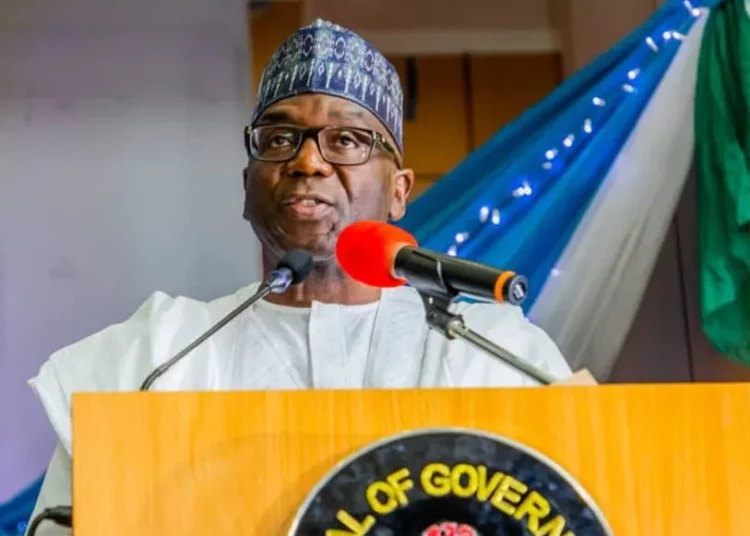As Nigeria grapples with the pressing challenges of food insecurity, governors of the 36 states of the federation have responded with unique strategies tailored to their specific agricultural strengths and vulnerabilities.
From the drought-prone states of the North to the floodplains of the South, state governments, in collaboration with federal authorities and international organisations, are making concerted efforts to combat hunger and improve agricultural productivity.
In a document obtained by the Nigeria Governors Forum, the North West states, known for its vast expanse of arable land, states like Kano, Jigawa, Zamfara, and Sokoto have focused on bolstering the production of staple crops such as rice, millet, and sorghum. Through the Central Bank of Nigeria’s (CBN) Anchor Borrowers’ Programme, thousands of smallholder farmers have received financial support and inputs to scale up their production.
For instance, Kano State, often referred to as the “commercial nerve centre of agriculture,” the main policy thrust is to attain food security and raise the income level of residents of Kano State.
For Agriculture, the administration of Abba Yusuf is working round the clock to transform all farming practice and build a practical agric-value chain to the benefit of all.
The development of Kano irrigation masterplan, Kano Livestock masterplan, Kano poultry masterplan, Kano Small ruminant masterplan, and Kano Fisheries masterplan.
Distribution of Agricultural inputs such as improved seeds of rice, maize, sorghum to subsistence farmers across44 local governments.
Rehabilitation of tertiary irrigation canals, with 3,288 farmers as beneficiaries at the cost of N292 million. They facilitated the introduction of Special Agro-Industrial Processing Zone programme (SAPZ) by African Development Bank (AfDB) worth $130 million to promote the production of rice, tomato, groundnut and Sesame seed.
Also, rice production initiatives by expanding irrigation systems. With water resources from the Tiga and Challawa dams, farmers can cultivate rice during both the rainy and dry seasons. Additionally, Zamfara State has invested in mechanized farming and fertilizer distribution to boost yield while addressing post-harvest losses.
While the Jigawa State Governor Umar Namadi embarked on a journey to Kigali, Rwanda earlier this month, leading a delegation to attend the national food systems summit 2024 all for food sovereignty and enhancing agricultural resilience. The governor reiterated his commitment to his 12-point agenda which agriculture is a mainstay. Central to these agenda, is the Rice Millionaire Project, the wheat project, and special agro-processing zones all these are well orchestrated to accelerate agricultural transformation.
Jigawa also has partnered the federal government on the spin project.
However, the region also faces challenges, with recurring conflicts between herders and farmers threatening food production. To address this, the federal government has introduced peace-building programmes and grazing reserves aimed at reducing tensions and protecting farmland.
The North East zone, ravaged by a decade-long insurgency, has struggled to maintain food production levels. States like Borno, Yobe, and Adamawa have been hit hardest by food insecurity, as the ongoing conflict has displaced millions of farmers and destroyed farmland.
In response, the Borno State government alongside international organisations such as the United Nations Food and Agriculture Organizsation (FAO) and World Food Programme (WFP), has initiated several programmes to restore farming activities in safe areas. The FAO’s “Green Shoots” project, for example, provides displaced farmers with seeds, tools, and training to rebuild their agricultural livelihoods.
Additionally, Yobe State has invested in climate-smart agriculture, introducing drought-resistant crops like cowpeas and millet to adapt to changing weather patterns.
Despite these efforts, the North East continues to face an acute food crisis, and humanitarian organisations remain critical in delivering emergency food aid to vulnerable populations.
The North Central region, comprising Benue, Niger, Kwara, Kogi and Nasaraw States remains the agricultural heartland of Nigeria. Often referred to as the country’s “food basket”, Benue, in particular, is known for its abundant production of yams, cassava, and maize, which feed a significant portion of the country.
Nasarawa State is making bold strides to transform its agricultural sector into a key economic driver. The state government, committed to revitalising agriculture, has led efforts to attract international investment and modernise farming practices – with a focus on bolstering support for farmers, upgrading infrastructure and enhancing security to foster substantial agricultural growth.
Kwara State is investing in processing plants for cashew and cassava and has initiated a large-scale industrial park covering over 300,000 hectares. Also, 20 hectares of seed cotton and ginnery is farmed. All these are to boost the agricultural production of the state, as these are all designed to enhance the livelihoods of its citizens.
The state government has focused on improving storage facilities to reduce post-harvest losses, which have plagued farmers for years. Through public-private partnerships, Benue and Niger have built modern silos and cold storage facilities, allowing farmers to store crops for extended periods. This initiative has been supported by the CBN and the World Bank’s Agricultural Transformation Agenda, aimed at increasing Nigeria’s food self-sufficiency.
Despite these successes, flooding along the River Benue remains a constant threat to food production in the region. To mitigate this, the state governments have begun dredging efforts and building levees to protect farmland from rising water levels.
In the South West, states like Oyo, Ogun, and Ekiti are turning to technology to improve agricultural productivity. The Oyo State government, in partnership with private tech firms, has introduced drone technology for precision farming, allowing farmers to monitor crop health, detect pests, and optimise irrigation.
In Ogun State, the Abiodun administration is simply in a class of its own. Governor Abiodun recently flagged off the harvest of the 200-hectare rice farm at Magboro in Obafemi Owode LGA of the state. In just three months, the farm cluster yielded 1,400 tonnes of rice. Projected to bring in N1 billion in revenue every three months, the project will now be scaled up to guarantee revenue in the region of N10 billion-N25 billion. The World Bank-assisted project meant to ensure the increased participation of the private sector in the economic development of the Gateway State is the brainchild of the Ogun State Economic Transformation Project. Farmers were sensitised and aggregated into ten groups that constituted the rice cluster, and the government supported them with 65 per cent of the cost of land preparation or mechanisation, while they contributed the rest.
On the other hand, has focused on agribusiness, encouraging youth participation in agriculture through programmes like the “Youth in Agribusiness” initiative. This scheme provides training in modern farming techniques, access to finance, and links to markets, aiming to reduce unemployment and improve food production.
The trainees who were mostly graduates, were trained on horticulture, cassava processing, poultry value-chain.
Additionally, the South-West states have invested heavily in processing plants to reduce dependency on food imports. Oyo State recently launched a cassava. Processing plant, which is expected to boost local cassava production and provide job opportunities.
The South-South region, characterised by its vast river systems and coastal areas, has embraced aquaculture as a key strategy to combat food insecurity. With dwindling fish stocks in the wild, states like Rivers, Bayelsa, and Cross River have invested in fish farming as an alternative to traditional fishing methods. While Ebonyi State promises massive initiatives in food storage facilities which is a key component towards sustainable agricultural development of the state.
Cross River State has also focused on expanding oil palm and cocoa production, partnering with international companies to improve yields and ensure sustainable practices. However, the region faces unique challenges from climate change, including rising sea levels and coastal erosion, which threaten farmlands and fisheries. The commissioner for agriculture and irrigation development, Hon. Johnson Andiambey Ebokpo, led a joint team on monitoring of the enumeration exercise for oil palm farmers in the state.
The Governor Bassey Edet Otu-led administration initiated the Cross River State Oil Palm Development Initiative (CRODI) and procured 3.5 million improved sprouted oil palm nuts from the Nigerian Institute for Oil Palm Research (NIFOR) in Benin City, Edo State to distribute to farmers in a bid to boost the oil palm subsector of the state.
To address this, the South-South states are working with the Nigerian Meteorological Agency (NiMet) and the United Nations Environment Programme (UNEP) to develop climate adaptation strategies. These include building flood barriers, introducing salt-tolerant crops, and promoting mangrove restoration to protect coastal ecosystems.
South-East: Revitalising Poultry and Cassava Farming
In the South-East, agriculture is experiencing a renaissance, with states like Anambra, Imo, and Abia investing heavily in poultry and cassava farming. Imo State has launched a “Cassava Revolution” programme, which provides farmers with improved cassava varieties and access to processing equipment, aimed at increasing output and reducing post-harvest waste. While their Enugu State counterpart is putting all hands on deck to ensure full provision of food storage facilities which is in tandem with the agricultural policies of the state government. Some special agro processing zones will have silos, the produce city, as well as the warehouses under the ministry of agriculture.
A few months ago, Governor Chukwuma Soludo officially launched this year’s distribution of 1,040,000 economic trees’ seedlings at the Achebe Stadium, Onisha South LGA in Anambra. These seedlings are for the following plants: oil palm, African breadfruit, bitter kola, kola-nut and pawpaw.
Anambra’s model is to distribute these resilient and well-researched seedlings to households who will not only use the produce from these seedlings to feed their households but would contribute to Anambra’s food production ecosystem by selling their surplus produce. These households would, in effect, increase the food production capacity of Anambra by the aggregation of their excess produce on market days.
Also, Soludo entered into a partnership with Anambra farmers called the Farm to feed for aggressive farming to encourage youth to farm and the elders in the state for food security. Anambra is also happy to be in the Spin program which is a federal government program.
Moreover, the South-East states are working to improve road infrastructure to facilitate the transportation of goods to markets. Better roads mean quicker access to consumers and reduced spoilage of perishable goods, helping farmers earn more and boost food security.
While Nigeria’s six geopolitical zones face unique challenges, from conflict and climate change to infrastructure deficits, each region has developed tailored approaches to combat food insecurity. As these initiatives continue to evolve, they offer hope that Nigeria can build a more resilient agricultural sector, capable of feeding its growing population and reducing dependence on food imports.





